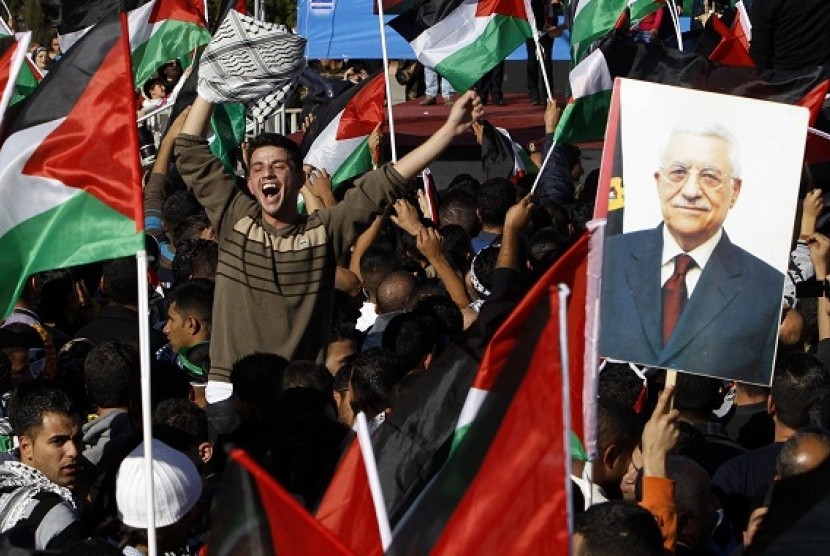REPUBLIKA.CO.ID, RAMALLAH - The Palestinian President Mahmoud Abbas has returned home to a hero's welcome after winning a resounding endorsement for Palestinian independence at the United Nations. Some 5,000 people thronged a square Sunday outside Abbas' government headquarters in the West Bank. Many hoisted Palestinian flags and balloons in the colors of the flag.
Abbas told the crowd that "we now have a state" and that "the world has said loudly, 'yes to the state of Palestine.'" The UN decision to recognize Palestine as a nonmember observer state does not change the situation on the ground. The Palestinians believe the strong endorsement will boost their leverage in future peace talks.
Israel to relatiate?
Israel on Sunday roundly rejected the United Nations' endorsement of an independent state of Palestine, and announced it would withhold more than 100 million USD owed to the Palestinians in retaliation for their successful statehood bid.
It was the second act of reprisal since the UN General Assembly voted overwhelmingly on Thursday to support the Palestinians' statehood initiative. Less than 24 hours later, Israel announced it would start drawing up plans to build thousands of settlement homes, including the first-ever residential developments on an ultra-sensitive piece of real estate near Jerusalem.
Prime Minister Benjamin Netanyahu declared the statehood campaign, led by Palestinian President Mahmoud Abbas, as "a gross violation of the agreements signed with the State of Israel."
"Accordingly, the government of Israel rejects the UN General Assembly decision," he said. Israel, backed by the US, campaigned against the statehood measure, arguing that only negotiations can deliver a Palestinian state.
The UN resolution spelled out the borders of a future Palestine, endorsing the Palestinian position that it comprise the West Bank, east Jerusalem and Gaza Strip, territories captured by Israel in the 1967 Mideast war. Israel rejects a full pullback to its 1967 lines, and says the resolution is a way to bypass border negotiations.
In Sunday's response, Finance Minister Yuval Steinitz said the government would also strike at the Palestinians' pocketbook, by withholding taxes and customs collected from Palestinian laborers and businesses on behalf of Abbas' cash-strapped Palestinian Authority, which led the statehood campaign.
The money will be used to help pay off the authority's debts to Israel, including 200 million USD owed to the state-run Israel Electric Corp., government officials said. This month, more than 100 million USD was to have been transferred; Steinitz said Israel would decide later whether to withhold future transfers as well.
The General Assembly decision late Thursday to accept "Palestine" as a non-member observer state in the West Bank, east Jerusalem and Gaza didn't grant actual independence to the 4.3 million Palestinians living in those areas. Israel remains an occupying force in the first two territories and continues to severely restrict access to Gaza, ruled by the Hamas militant group.


